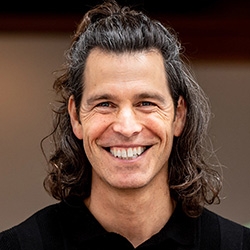

Search Results: challenge
-
Is it dangerous for large numbers of people to be absorbing disturbing news alone? Given the intensity of our times, making choices based on conscious awareness and discernment in relation to current events is essential for our ability to stay engaged, and to also wisely meet our collective challenges with agency and power. Here are five tips for how to help stay sane in relation to the news cycle.
-
While so many of us know how close we are to the edge of global catastrophe and want change, what makes the existing global system continue to function with our ongoing participation? Read on for more on the challenges and path towards learning to steward life and all the resources of this one planet for the benefit of all.
-
Our world is facing stressful times. And the more stress you experience, the less resourced you can become. But consider that you're not messed up, but rather, the challenges you bear is a response to manufactured environments and culture that are more hostile than they are kind towards our human souls and bodies. And so, let’s be clear. Let’s be discerning. Let’s be compassionate. Let’s pay attention.
-
In a world facing crisis and deep divides, there's a need for empathic community and connection. Here we reflect upon the importance of empathy, consciousness, and building a sense of community to address complex challenges and promote well-being. Slowing down, engaging in empathic conversations, and committing to a practice of empathy and mindfulness could be essential for personal and societal transformation.
-
Roxy Manning discusses the need to expand our understanding of observations within Nonviolent Communication (NVC). She challenges the idea of objective observation, noting its limitations, and introduces internal observations, citing personal experiences to illustrate their influence on emotions and self-perception. Additionally, she emphasizes systemic awareness as a crucial aspect of observation, highlighting its importance in understanding broader societal issues. Overall, Roxy advocates for a comprehensive approach to observations in NVC, incorporating external, internal, and systemic perspectives to foster inclusivity and empathy.
-
Exploring how stories and unmet needs each influence the cause of our feelings in NVC.
-
Can you give me advice on what to do when people won't talk to me? I find it very difficult to discover what their needs are that aren't being met! Also, how can I be effective with people who don't actually want to think about why they're being the way they are?
-
Trainer tip: NVC consciousness recognizes interdependence. In this process each person is autonomous; everyone's needs matter; people have choice and responsibility for their actions; there's abundance, and a valuing of coming together. The dependence / independence paradigm assumes we either need someone else to be whole -- or we don’t need others at all. Commit to living autonomously. Notice where you struggle with this.
-
Trainer Tip: We feel our freedom when we are willing to look at others’ needs and our own, evaluate all of them and work toward valuing everyone’s needs. Take the time to demonstrate that you value everyone’s needs as much as your own today.
-
Trainer Tip: The surest way to enjoy life is to do things that meet your needs. If you don’t enjoy a particular activity, consider the need you hope to meet by doing it. For instance, for each item you want to do consider the needs you're trying to meet. Connect to the joy of that need. Then for each ask: “How would I feel if I delayed finishing this item?”. Consider which items you want to continue, pause, or reprioritize. This can help increase life enjoyment.
-
We can shift from being absorbed and identified with our inner chatter and feelings to being the space of awareness of these things. Observe your breath. Then observe your mind generating thoughts. Next, feel sensations of your body, particularly the difficult ones. Now, connect with the underlying energy of needs. Ask your unconscious mind for universal needs words related to what you now notice, think and feel.
-
Often, people don't help others when others are in danger, whether it is a parent who is abusing a child, a man who is battering his wife, someone sexually harassing another, a bully making fun of someone, or a person who is abusing a pet. However, intervening can save lives. And bring enrichment, peace, safety, care, and justice to the world.
-
Greetings dear readers of the Growing Roots Newsletter! Mary Mackenzie invited me to be a guest writer for this issue to which I happily agreed. She also shared that her messages are typically more personal in nature, something I always appreciate in a newsletter. The challenge for me then is to...
-
Challenge racism with compassion and clarity, gain tools to foster reflection and systemic change.
-
Hello friends. I’m Roxy Manning. When Mary invited me to write this letter, I could not help but reflect on what has been most alive for me recently… the way many of us will easily help someone else, but fear to ask for help for ourselves. On December 4, I had an operation. My doctor predicted my recovery would take three weeks. As I prepared for the time off, I rushed to complete all of my work and personal commitments. I prepped and froze dishes so I would have things to eat after and arranged meal deliveries. Very few people knew I was having an operation and I reached out to only one person for support after. In hindsight, I was doing everything I could so...
-
- Share NVC in a way that keeps your group engaged
- Walk away with practical facilitation tips and 5 session outlines
- Know how to respond to nay-sayers
- Learn how to promote your work
-
Miki Kashtan explores how to respond to group conflict wisely when you’re not directly involved.
-
Read here about patriarchy as a system, its impact on men and women, how its rooted in separation and control, leading to dominance and submission. Under patriarchy, even men are brutalized. Instead, we can embrace nonviolence to challenge patriarchy and its offspring (eg. capitalism, child trafficking, etc). And to make a lifelong commitment to undo socialization, act within our influence, and work towards liberation of all.
-
Amidst the Israel/Palestine war we see polarizing media portrayals and the battle for public opinion. Read how one person shares his deep, personal connections to the Israel/Palestine conflict, expresses the trauma and viewpoints of both Palestinian and Israeli experiences -- in a way that aims to transcend polarizations, hold compassion, and understand the complexity on both sides. Despite the immense challenge that defies easy resolution, he holds hope, noting historical reconciliations such as the ones between Germans and Jews.
Quick Links

Stay in Touch!
We value your privacy, won't share your email address and you can easily unsubscribe any time.



















